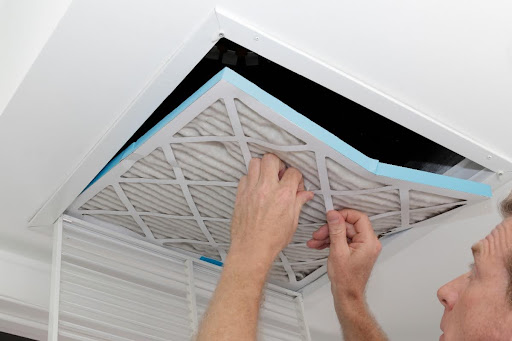If you’re trying to achieve a cleaner, healthier home environment, you may be asking yourself, “What type of AC filter should I use?” It’s a valid question, given the central role air filters play in purifying the air we breathe. They not only trap dust, pollen, and other airborne particles but also significantly affect the efficiency and longevity of your HVAC system. Hence, making an informed choice is paramount for both your health and your pocket.
Types of HVAC Filters
So, what type of AC filter should you use? Before answering this question, let’s explore the basics. HVAC filter types vary widely, each designed to meet specific needs and preferences. From standard fiberglass filters to high-efficiency particulate air (HEPA) filters, the spectrum is broad. Electrostatic filters, pleated filters, and UV filters are also popular choices, each with unique benefits. Recognizing the types of HVAC filters available is the first step in making an educated decision.
Fiberglass Filters: A Cost-Effective Solution
Starting with the most basic types of air filters, fiberglass filters offer a budget-friendly option. While they provide low air filtration, they’re sufficient for blocking larger particles like lint and dust. However, for those concerned with allergies, these might not be the best HVAC air filter option.
Pleated Filters: Enhanced Air Quality
Pleated filters, made from polyester fabrics or cotton, stand out among the various air filter types available for their higher efficiency. Their design increases the filter’s surface area, allowing for improved trapping of airborne pollutants like pollen, pet dander, and mold spores. When pondering what type of AC filter you should use, consider pleated options for a balance between cost and performance.
HEPA Filters: The Gold Standard for Clean Air
For households requiring the utmost in air purification, HEPA air filters are a top contender. Meeting strict standards for air quality, they effectively filter dust, pollen, and other tiny particles. While perfect for improving indoor air quality, they might impose significant static pressure on the HVAC system, so compatibility checks are necessary.
Electrostatic Filters: Innovative Air Cleaning
Electrostatic filters create static electricity as air passes through them, attracting dust and other airborne particles. They come in both washable and disposable formats, offering a convenient and often effective solution for trapping pollutants.
UV Filters: A High-Tech Option
UV filters use ultraviolet light to kill bacteria and viruses, offering an additional layer of protection against airborne pathogens. While not traditional filters in the sense of trapping particles, they can be an excellent addition to a comprehensive air purification strategy.
Choosing the Best HVAC Air Filter for Your Home
Determining what type of AC filter you should use hinges on several factors: your household’s specific needs, the HVAC system’s requirements, and your budget. For those who have allergies or respiratory issues, HEPA filters or high-efficiency pleated filters may offer the best relief. Conversely, if basic dust control is your goal, fiberglass or standard pleated filters might suffice.
Consider the filter’s Minimum Efficiency Reporting Value (MERV rating) when selecting. This rating reflects the filter’s ability to capture larger particles; a higher MERV rating indicates superior filtering ability but also requires more energy to pull air through.
The Role of MERV Ratings
MERV ratings range from one to 20, with higher numbers indicating a filter’s superior capability to trap fine particles. While a higher MERV rating sounds like the best choice at first glance, it’s crucial to match the filter’s rating with what your HVAC system can handle without reducing airflow or static pressure to detrimental levels. The ideal is to strike a balance between air quality and maintaining the HVAC system’s efficiency without imposing undue strain.
Maintenance Matters: Keeping Your Air Clean
Regardless of the air filter type you choose, regular maintenance is crucial. A clogged or dirty filter not only compromises air quality but can also strain your HVAC unit, leading to inefficiencies or breakdowns. Aim to check your filters monthly and replace or clean them as recommended by the manufacturer.
What Type of AC Filter Should You Use?
To recap, the quest for the best HVAC air filter depends on individual needs and system specifications. Considerations like air quality concerns, HVAC system efficiency, and budget play significant roles in this decision. Whether it’s fiberglass, pleated, HEPA, or electrostatic filters, each type has its advantages and drawbacks.
Your Next Steps Toward Cleaner Air
Now that you’re armed with knowledge of what type of AC filter you should use, it’s time to take action. Evaluate your needs, consult your HVAC system’s guidelines, and make an informed choice. Remember, the right filter not only improves air quality but also enhances the longevity of your HVAC systems.
Schedule Your AC Maintenance Today!
So, what type of AC filter should you use? Don’t let this question linger any longer. Contact Squeak’s Plumbing Heating & Air today for expert guidance and professional AC service in Denver, CO and the surrounding areas! Our team can help you select the best HVAC air filter for your home, ensuring your air conditioning system operates smoothly and efficiently.
Whether you need routine maintenance or AC installation in Denver, we’ve got you covered. Clean air is a clear choice, and with the right support, you can breathe easier knowing your home’s air quality is in expert hands!



